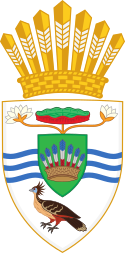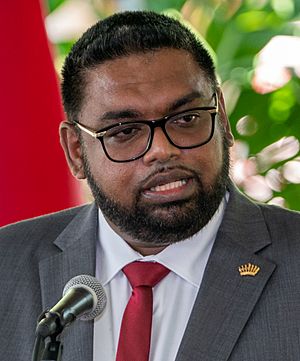President of Guyana facts for kids
Quick facts for kids President of theCo-operative Republic of Guyana |
|
|---|---|

Current presidential standard
|
|

Presidential emblem
|
|
| Style | His Excellency |
| Residence | State House, Georgetown |
| Seat | Georgetown |
| Term length | Five years,
renewable once
|
| Constituting instrument | Constitution of Guyana (1980) |
| Precursor | Queen of Guyana |
| Inaugural holder | Arthur Chung |
| Formation | March 17, 1970 |
| Succession | Prime Minister of Guyana (as First Vice President) |
| Deputy | Vice Presidents of Guyana |
| Website | https://motp.gov.gy/ |
The President of Guyana is the country's main leader. This person is both the head of state (the symbolic leader) and the head of government (the one who runs the country day-to-day). The President is also the commander-in-chief of Guyana's armed forces. This means they are in charge of the military. The President also leads the Orders of Guyana, which are special awards given to people. Since the President is the commander-in-chief, they also act as the Minister of Defence.
Contents
How the President's Role Changed
When Guyana became a republic in 1970, the President was chosen by the National Assembly. This is like a parliament. The President's job was mostly ceremonial, meaning they had important duties but not much real power. Arthur Chung was the first President under these rules.
In 1980, the country's rules (the constitution) were changed. After this, the President became an "executive president." This meant the President now had real power. They became both the head of state and the head of government. Forbes Burnham was the first person to become President after these big changes.
How the President is Chosen
People in Guyana vote for their President during parliamentary elections. Each political party chooses one person to be their presidential candidate. The candidate whose party gets the most votes becomes the President. They usually serve for five years.
What if two candidates get the exact same number of votes? This has never happened in Guyana's history. But if it did, the President would be chosen by drawing lots. This would happen in front of important legal officials and the public.
Who Can Be President?
To become President, a person must meet certain requirements:
- They must be a citizen of Guyana from birth or through their parents.
- They must have lived in Guyana for seven years before the election.
- They must be able to be a member of the National Assembly. This means:
- They must be a Guyanese citizen aged 18 or older.
- They must be able to speak and read English well enough to take part in government meetings.
Also, a person cannot be President if they are a citizen of Guyana and another country at the same time. This rule was made stronger by a court decision in 2019.
Taking the Oath of Office
Before starting their job, the President must take an oath. This is a special promise. They promise to be loyal to the people of Guyana. They also promise to do their job fairly and to protect the country's constitution. The President can choose to add "so help me God" at the end of the oath.
When the President is Away or the Job is Empty
If the President is out of Guyana or sick, the Prime Minister takes over as acting President. If the Prime Minister is also away, another minister chosen by the President can act as President. This temporary President will serve until the real President can return to duty.
Sometimes, a President might be too sick to give instructions. In such cases, the temporary leader still takes over. However, they cannot make big changes like dissolving the National Assembly or firing people the President appointed. The acting President stops when the permanent President says they are well enough to return.
The President's job becomes officially empty if:
- The President passes away.
- The President resigns (quits) by writing a letter to the Speaker of the National Assembly.
- The President is removed from office because they are unable to do the job.
- The President is removed for breaking the constitution or for very bad behavior.
If the job becomes empty for any of these reasons, the Prime Minister becomes the new President permanently. They are not just acting anymore.
Who Takes Over if the President's Job is Empty?
If the President's job becomes empty, there is a clear order of who takes over:
- First, the Prime Minister.
- If there is no Prime Minister, then any minister who is an elected member of the National Assembly, as decided by the Cabinet.
- If there is no Prime Minister and no Cabinet, then the Chancellor of the Judiciary takes over.
Symbols of the President's Office
The Cacique's Crown
The Cacique's Crown is a special symbol for the President of Guyana. It was chosen in 1970 when Guyana became a republic. All Presidents have used it. You can see it on official papers, the President's car, in their office, and at the State House. The Crown usually has seven feathers and is gold-colored. It is also a main part of Guyana's coat of arms. It is not allowed for anyone else to use this symbol without permission.
 |
 |
| Cacique's Crown | Presidential vehicle plate |
The Arms of the President
The Arms of the President were adopted on February 23, 1970. This symbol includes a shield from Guyana's coat of arms. Inside it is a green shield with a colorful Cacique's Crown. The whole design is topped with a gold Cacique's Crown.
This symbol is not used as often as the Cacique's Crown. However, during David Granger's time as President (2015-2020), it was used more frequently. It was a main part of his presidential flag.
 |
| Arms of the President |
Guyana's First Constitution
Guyana became an independent country on May 26, 1966. Its first constitution said that Guyana was a democratic and independent state. At first, the British monarch was still the symbolic head of the country. They were represented by a Governor General. The real power was with the Prime Minister and their ministers.
In 1970, Guyana became the Cooperative Republic of Guyana. This was a big step. It meant Guyana cut its last major ties to Britain. The Governor General was replaced by a Guyanese President. This person was the country's first President.
Even after becoming a republic, Guyana stayed part of the Commonwealth of Nations. This group includes many former British colonies. Being in the Commonwealth helped Guyana with trade and defense. For example, Britain's defense support was seen as a way to protect Guyana from claims by Venezuela.
In 1978, there was a vote (referendum) to change the constitution. The proposed change would make it easier to change important parts of the constitution. Instead of needing a public vote, changes could be made with a two-thirds vote in parliament. This also meant the elections planned for that year were postponed.
See also
 In Spanish: Presidente de Guyana para niños
In Spanish: Presidente de Guyana para niños
- List of Commonwealth heads of government
- List of governors of British Guiana
- List of heads of state of Guyana
- Vice President of Guyana
- List of prime ministers of Guyana
 | Percy Lavon Julian |
 | Katherine Johnson |
 | George Washington Carver |
 | Annie Easley |


